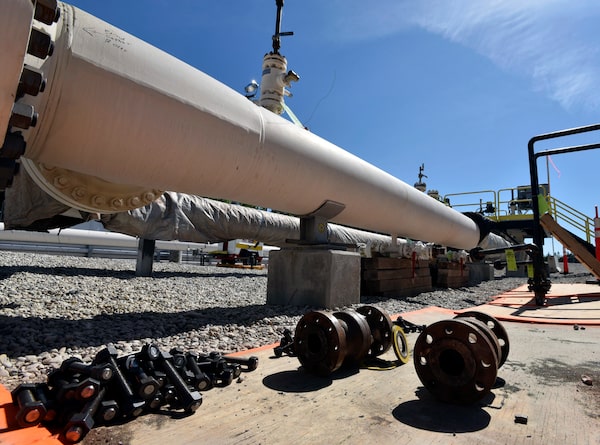
Nuts, bolts and fittings are ready to be added to the east leg of the pipeline near St. Ignace, Mich., as Enbridge prepares to test the east and west sides of the Line 5 pipeline under the Straits of Mackinac in Mackinaw City, Mich., on June 8, 2017.Dale G. Young/The Associated Press
The U.S. Army Corps of Engineers said Wednesday that it has opted to conduct an extensive review of Enbridge Inc.’s proposed Line 5 tunnel under the Great Lakes, which could significantly delay a solution the company has offered to avert a full shutdown of the pipeline.
It has chosen to prepare an environmental-impact statement, a more wide-ranging study than an environmental assessment, which was the other option available. The Army Corp’s website explains that the impact statement is “the most thorough and comprehensive level of National Environmental Policy Act (NEPA) documentation used to assist in making a decision.”
Enbridge Line 5 is a key petroleum conduit for Ontario and Quebec that has run through the Great Lakes region for close to 70 years. However, the state of Michigan is trying to stop it from operating because of fears that oil could leak into Lake Michigan and Lake Huron where the pipeline crosses the Straits of Mackinac.
Michigan’s Department of Environment, Great Lakes and Energy has issued a permit for the tunnel, but approval from the Army Corps is also needed. The federal agency would consider potential effects on the straits and adjacent wetlands.
Last fall, Michigan Governor Gretchen Whitmer revoked an easement permit first granted in 1953 that allows Line 5 to cross the Straits of Mackinac waterway between the state’s upper and lower peninsulas, citing the risk of oil spills and calling it a “ticking time bomb.” She gave Enbridge until May 12 of this year to comply and warned the company that it would be breaking the law after that.
Calgary-based Enbridge has challenged these actions in U.S. federal court, arguing that only the federal government can pass judgment on the safety of a pipeline. And the company has defied Ms. Whitmer, saying it would not shut the line down unless ordered to do so by a judge. The state is seeking to have the matter sent back to state-level court. Enbridge and the Michigan state government are now in court-ordered mediation talks.
Enbridge has proposed a US$500-million tunnel that would run deep under the Straits of Mackinac and which the company said would shield the Great Lakes from spills. The company had previously estimated it would take three years to build the tunnel but has been awaiting regulatory approval.
The U.S Army Corps’ environmental-impact statement represents a lengthier regulatory review. Jaime A. Pinkham, acting assistant secretary of the Army for civil works, announced Wednesday that it is necessary “because of the potential for impacts significantly affecting the quality of the human environment.”
He said the Army Corps of Engineers “will ensure all potential impacts and reasonable alternatives associated with this project are thoroughly analyzed and will ultimately support a decision on the permit application.“
Mr. Pinkham said his organization “received thousands of public comments” on the proposed project “which warrant further review,” including “impacts to navigation” in the Great Lakes.
He said the Army Corps will also be conducting consultations with Indigenous people, in accordance with instructions laid out by President Joe Biden in January: the “Memorandum on Tribal Consultation and Strengthening Nation-to-Nation Relationships.”
In a statement, Enbridge said Wednesday’s development would push back the timeline for constructing a tunnel.
“Project permitting continues to be the driver of project timing. The decision by the U.S. Army Corps of Engineers to complete an environmental-impact statement instead of an environmental assessment for the Great Lakes Tunnel project will lead to a delay in the start of construction on this important project,” company spokesman Jesse Semko said in a statement.
“Enbridge will continue to work with the U.S. Army Corps of Engineers on its review of our application and towards a successful conclusion to this process, which began when we filed our permit application in April 2020.”
Mr. Semko said Enbridge believes that a majority of Michiganders back the Great Lakes Tunnel project. “To date, the company has spent more than [US]$100-million on the project. Enbridge remains intensely focused on project permitting and the sustained and safe operation of Line 5 until the tunnel is completed,” he said.
Line 5 carries up to 540,000 barrels a day from Alberta and Saskatchewan through two Great Lakes states before re-entering Canada at Sarnia, Ont. The Canadian government has warned that a shutdown would represent a threat to this country’s energy security.
Enbridge says Line 5 has never leaked into the Straits of Mackinac, but critics note that it has leaked elsewhere along the route.
They also point to 2010, when another pipeline operated by Enbridge, Line 6B, ruptured and released 3.3 million litres of oil into a tributary of the Kalamazoo River. That became one of the largest inland oil spills in U.S. history and took five years to clean up.
With a report from Associated Press
 Steven Chase
Steven Chase